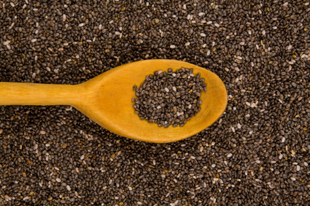 MUFAs. We’ve all heard that cool, yet cryptic, acronym uttered again and again. But what exactly are they?
MUFAs. We’ve all heard that cool, yet cryptic, acronym uttered again and again. But what exactly are they?
First, let’s start the deciphering process by unravelling the name: ?MUFA? stands for ?monounsaturated fatty acids.? Although this may sound complicated, we come across these fatty acids on a daily basis. Did you have peanut butter on your toast this morning, or did you eat a handful of walnuts and almonds for a snack? And if that salad you ate last night contained fresh avocado pieces and was dressed with olive oil?you’ve been consuming monounsaturated fatty acids, or MUFAs.
So are MUFAs just another health scam? No! With positive MUFA research abounding, It’s safe to say that, in appropriate quantities, they are definitely a worthwhile dietary addition.
What might be a scam, though, is the prevalent idea that our bodies do not need fat. Fat is important in our diet; it provides energy and helps us to absorb fat-soluble vitamins (A, D, E, and K), and certain essential fats can alleviate some skin conditions. The key for dietary fat is the type of fat we consume. Certainly, fast-food trans fats have less than valuable, and potentially negative, effects on our bodies. However, ?good? fats, like MUFAs, definitely have a role in our nutritional health.
Let’s talk about this role. First, disease prevention: a daily intake of MUFAs has been repeatedly shown to exert preventative action against heart disease, stroke, and Type 2 diabetes (adult-onset diabetes).
One of these fatty acids? most positive benefits heart-wise is their potential ability to improve a person’s lipid, or cholesterol profile, according to the American Heart Association. MUFAs are also a key component of the Portfolio Diet, which uses soluble fibre, soy, and plant sterols to decrease, or at least control, elevated cholesterol levels.
 Weight loss, anyone? It’s true; these fats can actually help you slim down. The American Diabetes Association promotes MUFA consumption, since diets with adequate intake of these fatty acids reduce abdominal fat, particularly in comparison with the typical, carbohydrate-rich, MUFA-poor diet that many of us consume. The Flat Belly diet, advertised across North America, advises consuming MUFAs for a smaller waistline. Interestingly, it appears that the slimming effects of a MUFA-rich diet are still evident even when other aspects of the diet or lifestyle go unchanged.
Weight loss, anyone? It’s true; these fats can actually help you slim down. The American Diabetes Association promotes MUFA consumption, since diets with adequate intake of these fatty acids reduce abdominal fat, particularly in comparison with the typical, carbohydrate-rich, MUFA-poor diet that many of us consume. The Flat Belly diet, advertised across North America, advises consuming MUFAs for a smaller waistline. Interestingly, it appears that the slimming effects of a MUFA-rich diet are still evident even when other aspects of the diet or lifestyle go unchanged.
How many MUFAs must be consumed before experiencing positive effects? Although currently there are no specific guidelines, the general rule is to consume one form of MUFA at each meal (for example, peanut butter at breakfast, avocados at lunch, and olive oil at dinner). In fact, the American Heart Association recommends that 15 per cent of our daily calorie intake be composed of MUFAs.
Can there be too much of a good thing? Yes; It’s the case with most things in life, and MUFAs are no exception. Overdosing can cause health concerns; although many of these claims have yet to be studied in further detail, it appears that overconsumption of MUFAs can lead to insulin resistance, which fuels diabetes. It’s interesting to note that frequent and small, but adequate, amounts of these fatty acids help prevent diabetes, but overdoing it may have the opposite effect.
I’m planning a week filled with adequate MUFA consumption, and I’m sure you are, too! To make your shopping list easier, and to keep variety in your diet, the following is a list of good foods that contain MUFAs: olive oil and olives, avocados and avocado oil, nuts (almonds, walnuts, brazil nuts, cashews, macadamia nuts, hazelnuts, pecans, and pistachios), peanuts, soy, sesame seeds, sunflower seeds and sunflower oil, and tea seed oil (a newly available oil, produced from the tea plant).
Enjoy your adventure to good health!
Katie D?Souza is an AU graduate and a licensed naturopathic doctor. She currently lives in Ontario.
Disclaimer: The information contained in this article is for personal interest only; it is not intended for diagnosis or treatment of any condition. Readers are always encouraged to seek the professional advice of a licensed physician or qualified health care practitioner for personal health or medical conditions.


